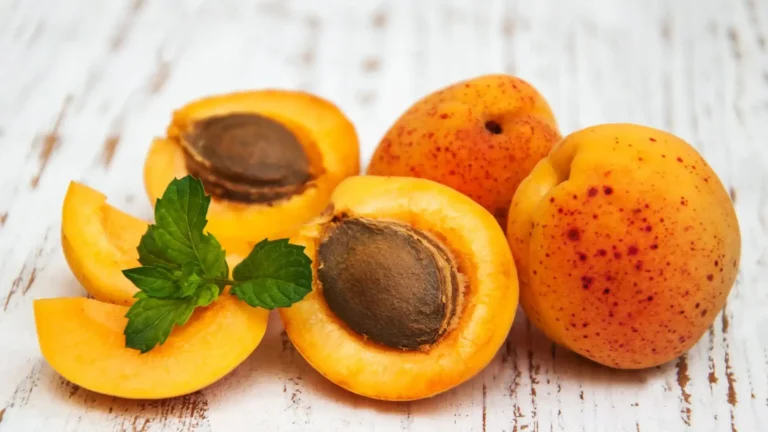The benefits of apricot oil extend far beyond its delightful aroma. Extracted from the kernels of the apricot fruit, this oil is a treasure trove of nutrients, making it a staple in skincare and health regimens.
Rich in vitamins A, C, and E, apricot oil offers moisturizing, anti-inflammatory, and antioxidant properties. Its lightweight nature allows for easy absorption into the skin, promoting softness without leaving a greasy residue. Also, ideal for sensitive skin, apricot oil soothes, nourishes, and revitalizes, making it a versatile addition to any beauty routine.
Discover how incorporating apricot oil can enhance your skin’s health and glow.

Nutritional Profile of Apricot Oil
The nutritional profile of apricot oil highlights apricot kernel oil benefits, showcasing a rich composition of essential fatty acids, vitamins, and minerals. This oil is predominantly composed of unsaturated fats, primarily oleic acid, which promotes heart health and moisturizes the skin from within. Linoleic acid, another crucial component, supports skin repair and renewal. These essential fatty acids are key to maintaining the skin’s barrier function and reducing inflammation. Oleic acid and linoleic acid also make it an excellent moisturizer that promotes skin elasticity and reduces signs of aging.
Vitamins A, C, and E in apricot oil act as powerful antioxidants to protect the skin from damage and support healthy cell regeneration. Additionally, minerals like potassium and magnesium enhance its skin-soothing capabilities.
Compared to other popular oils, apricot oil stands out for its lighter texture and quick absorption, offering a non-greasy finish ideal for all skin types. While coconut oil is known for its deep moisturizing properties, it can be too heavy for some; apricot oil provides a lighter alternative. Similarly, while argan oil is celebrated for its hair benefits, apricot oil offers comparable nourishment with added versatility for skin care. It also offers a higher vitamin E content than almond oil, giving it a superior antioxidant boost. When compared to olive oil, apricot oil has a similar fatty acid composition but offers a lighter feel, making it preferable for skin care.
Apricot oil’s unique blend of nutrients makes it a superior choice for those seeking a natural, multi-purpose oil that nurtures the skin and hair without the heaviness associated with other oils.
Health Benefits of Apricot Oil
The health benefits of apricot oil are vast and impactful on various bodily systems. Apricot oil benefits cardiovascular health by being rich in unsaturated fats, which help to maintain healthy cholesterol levels and promote heart health. Further, apricot kernel’s oleic acid content aids in improving the heart’s overall function and reducing the risk of heart disease.
The antioxidant properties of apricot oil play a crucial role in combating oxidative stress, which is linked to chronic diseases and aging. Vitamins A and E, along with catechins and flavonoids, neutralize free radicals, protecting cells from damage and supporting the body’s natural healing processes.
For digestive health, apricot oil can be a soothing agent. Its anti-inflammatory properties help in reducing inflammation in the digestive tract, easing disorders like ulcerative colitis and gastritis. Additionally, the oil aids in nutrient absorption and in improving gut health.
Boosting the immune system is another significant benefit of apricot kernel oil. The vitamins and minerals present, including vitamin E, act as immune enhancers, fortifying the body’s defenses against infections and diseases.
By incorporating apricot oil into your diet or skincare routine, you can harness these benefits, promoting a healthier heart, a more robust immune system, improved digestive health, and effective protection against oxidative stress.

Apricot Oil in Skincare
Apricot oil benefits for the skin are diverse and significant, making it a cherished ingredient in skincare routines. Its hydrating properties are exceptionally effective for dry skin, as apricot oil is rich in essential fatty acids that nourish and moisturize the skin deeply, locking in moisture and preventing dryness.
The anti-aging benefits of apricot kernel oil stem from its high content of antioxidants, vitamins A, C, and E, which help reduce signs of aging by promoting skin elasticity and reducing the appearance of fine lines and wrinkles. These nutrients also aid fresher, younger-looking skin.
For those dealing with skin conditions like eczema, psoriasis, or acne, apricot oil can be a soothing remedy. Its anti-inflammatory and antibacterial properties help to calm irritation, reduce redness, and promote healing, making it an effective treatment for sensitive and problematic skin types.
Incorporating apricot oil into your skincare routine is easy and safe. A few drops can be warmed between the hands and gently massaged onto the face or body for direct application. It can also be mixed with other natural ingredients to create DIY face masks or scrubs. To ensure it is compatible with your skin, do conduct a patch test before full application.
In this way, with its gentle and natural composition, apricot oil is a versatile skincare ally, suitable for daily use and all skin types.
Apricot Oil for Hair Care
Apricot oil benefits for hair are manifold and contribute significantly to hair health and beauty. The oil’s nutrients deeply nourish the scalp, promoting a healthy environment that reduces dandruff and soothes scalp irritations. Its moisturizing properties combat dryness and can prevent scalp flakiness.
Regarding hair growth, the benefits of apricot oil for hair are evident in its ability to stimulate the follicles, thanks to the rich blend of vitamins and minerals it contains. This stimulation supports healthy hair growth, making strands stronger and reducing breakage.
One of the key uses of apricot kernel oil for hair is the conditioning effect it has on hair. It naturally softens hair, improves texture, and adds a luminous shine without weighing it down. Its lightweight nature makes it perfect for all hair types, from fine to thick, providing hydration and enhancing silkiness.
For application tips, incorporating apricot oil into your hair care routine is straightforward. It can be used as a pre-shampoo treatment to moisturize the scalp and hair or added to your conditioner for an extra boost of hydration.
For a leave-in treatment, a few drops can be applied to the ends of damp hair to smooth frizz and add shine. Always start with a small amount to see how your hair responds, adjusting as necessary for the best results. When used regularly, apricot oil can transform your hair, leaving it healthy, shiny, and beautifully conditioned.
Culinary Uses of Apricot Oil
In addition to apricot kernel oil benefits for the hair, apricot oil extends its uses into the realm of cooking as well. Apricot oil is suitable for various cooking methods, including sautéing, grilling, and baking. Its high smoke point makes it a versatile choice for high-heat cooking and salad dressings.
The flavor profile of apricot oil is notable for its mild, nutty taste and a subtle hint of sweetness. This delicate aroma enhances dishes without overpowering them, making it an excellent addition to both savory and sweet recipes.
Replacing traditional cooking oils with apricot oil in recipes can offer a healthier alternative. Its rich content of monounsaturated fats contributes to heart health and can help lower bad cholesterol levels.
Whether drizzled over a salad, used in marinades or as a cooking oil, apricot oil adds a nutritious and flavorful twist to everyday meals. Its use encourages a step towards a healthier diet without sacrificing taste or versatility in cooking.
Choosing the Right Apricot Oil
Choosing the right apricot oil involves understanding the differences between cold-pressed and refined varieties. Cold-pressed apricot oil is extracted without heat, preserving its natural nutrients, flavor, and color, making it ideal for skincare and culinary uses. Refined apricot oil, while more heat-tolerant, may lack some of the nutritional and aromatic properties of its cold-pressed counterpart.
When purchasing apricot oil, quality indicators include a clear, light color and a mild, nutty aroma. Look for oils labeled as organic or non-GMO to ensure you’re getting a product free from unwanted chemicals and alterations. Packaging is also crucial; opt for apricot oil in dark glass bottles to protect it from light degradation.

For storage and shelf life, keep apricot oil in a cool, dark place to maintain its integrity. A properly stored bottle of cold-pressed apricot oil can last up to a year, while refined oil may have a slightly longer shelf life. Always check the oil for any changes in smell or color before use, as these can indicate spoilage. Following these best practices ensures that apricot oil retains its beneficial properties and remains safe for use in your skincare routine or culinary creations.
FAQs on Apricot Oil Benefits
What is apricot oil good for?
Apricot oil is celebrated for its versatility, offering numerous benefits for skin, hair, and overall health. It moisturizes dry skin, reduces signs of aging, soothes inflammation, and enhances hair shine and strength. Additionally, its nutritional profile supports heart health when included in the diet.
Can we apply apricot oil directly on the face?
Yes, apricot oil can be applied directly to the face. Its lightweight and non-greasy nature makes it perfect for nourishing the skin without clogging pores. It’s suitable for all skin types, providing hydration and aiding in soothing sensitive skin.
Is apricot oil good for usage under the eyes?
Apricot oil is excellent for the delicate under-eye area. Its high vitamin E and fatty acid content helps to moisturize and reduce the appearance of fine lines and dark circles. Applying a small amount gently under the eyes can refresh and brighten the skin.
Does apricot oil tighten skin?
While apricot oil is known for its moisturizing and nourishing properties, it also contributes to skin elasticity. Its vitamin A and E content can help to stimulate collagen production, which in turn may tighten the skin and reduce the signs of aging. Regular use can lead to firmer, more youthful-looking skin.








